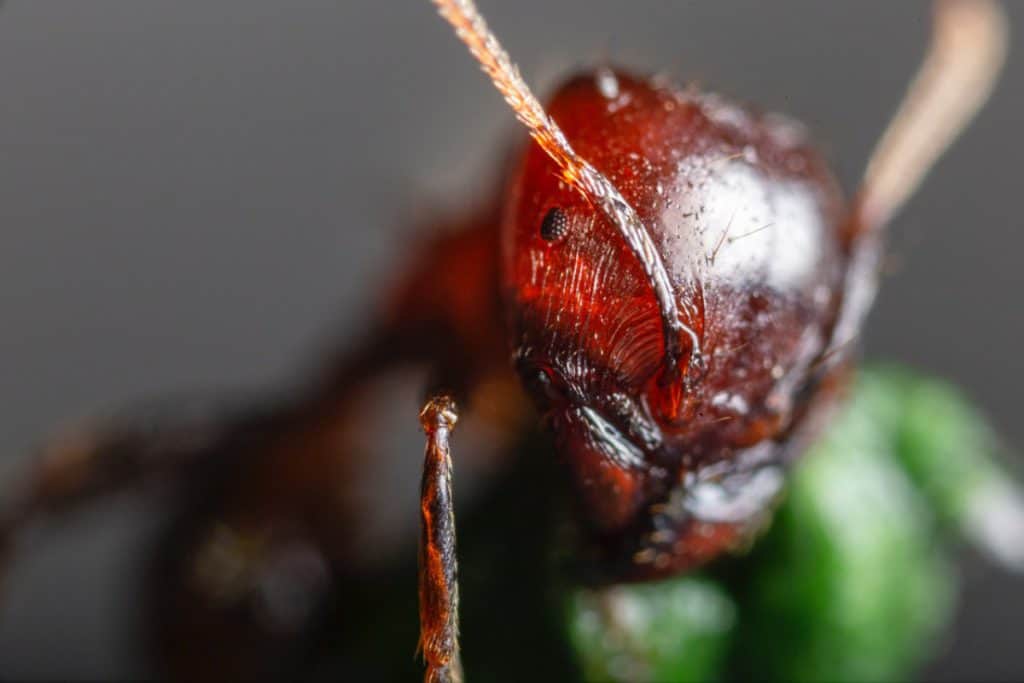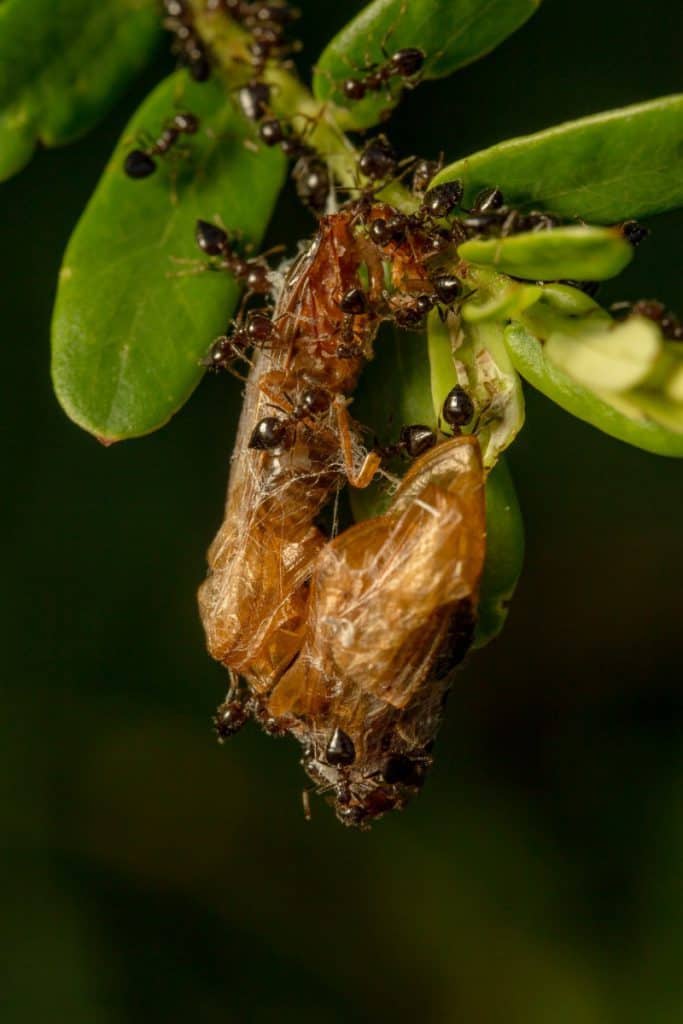
If you enjoy reading this article, why not check out our articles on Can Ants Affect House Foundations? and Can Ants and Worms Live Together?
My house is a common nesting place for ants. Whether they brood under the kitchen sink or in my garden, these ants feed on my food, sweets, and my garden produce. I usually spray ant poison on their nests to ensure that they don’t come back. However, I’ve noticed that they tend to come back to the same spot even though I have tried to exterminate them a hundred times! I did some research about this to know if ants can become immune to my ant poison.
Can ants become immune to poison?
Yes. As they are living creatures, they build systems and methods to be able to survive the poison. Their immunity depends on the toxicity of the pesticide, their genetic and physiological structure, and other environmental factors that help them evade death from future poisoning.
Knowing and understanding these factors of immunity against poison will help you exterminate infesting ants. In this article, we will be going over physiological, genetic and environmental factors on immunity and some of the survival strategies that ant colonies take against ant poison.
If you also have ants in your home but aren’t quite sure about using poison to get rid of them, check out our article What Ants Don’t Like: Natural Ways to Repel Ants.
Factors that Encourages Immunity In Ants
There are several factors that govern the immunity levels of ants in response to the dangers of their environment. Facing dangers of extermination every day, these ants are doing everything they can do in order to survive. While most of them are becoming more exposed to ant poison, some ants have systems in their physical structure, function, and their environment in order to protect themselves from harm, including death by poisoning.
Physiological Factors
Evolution is the key to understanding the immunity of ants from any insecticide or pesticide. As much as they want to survive, their physiology has to adapt to it. Depending on the species of ants and their level of exposure to the poison, most of them changed their antennae and make it able to detect harmful substances. This is part of the evolution series that Rachel Carson had predicted in her book, Silent Spring, about how these animals considered as pests will become more immune to pesticides and insecticides because of our continued use of these poisons in killing these organisms right away.
Somehow, this time in human history has made these insects, especially ants, stronger than they were fifty to sixty years ago. While they are still susceptible to death by inhaling or eating these ant poisons, most of them have created physiological systems and carry these throughout their evolution. Therefore, their continuous exposure to the poison makes them more resistant to it. This, however, varies from every ant species and their distinct activities alongside their genetic structures and the influence of the environment where they currently nest. Ants are extremely strong – take a look at our article How Strong Are Ants? to learn more.
Genetic Factors
While these ants continue to restructure themselves to adapt to the dynamic yet dangerous environment they are living in, they pass on the changes to the next generation. This means they are now able to take ant baits like it’s just their regular food and make these baits useless.
More than their resistance to poison and their ability to distinguish it, those who have received the genetic alteration will learn how to digest these poisons and still continue to live. As much as they have survived 140 million years of existence, they would survive this danger of becoming poisoned. Also, their current genetic structure has determined their hierarchy and killing just one ant with poison will make the rest learn from its death and make their colonies stronger and more resistant to ant poison.
While every species of ants have a distinct reaction to ant poisons available in the market, most of them are genetically-related, at about 75%, and it is possible that all ant species will develop the resistance of every poison variant. Thus, the chemical war to exterminate infesting ants continues but gives humans a losing edge through their genetic restructure and evolution process to survive such war.
Environmental Factors
Through the development of their genetic and physiological structures, they would be able to mold their environment to their advantage. While it is quite known how they are tricked with the bait, not everyone in the colony gets to partake the meal, especially queen ants. Most baits only target workers and some of the soldier ants but the queen herself only takes the most important protein in order for her to reproduce more ants. As most baits are only applied with sugar and syrup with less protein substance, the queen does not partake the deadly bait. This keeps her safe from poisoning.
The network of ant hills and nests underground makes an impenetrable structure against all types of toxic substances. Although poison can surely kill some of the ants in one nest, those that survived will move to another nest and will continue to do their work or rebuild the nests after a period of time when the potency of the poison has depleted. Most of the ant’s nest is buried deep underground. If you are planning to spray the poison from the surface and the cracks where the ant goes in and out, chances are it will surely get filtered by the soil before it reaches the ants.
Other important environmental factors like the weather and season also determine the movement of the ants and their schedule on foraging, the increase of their sensitivity to their environment especially with determining protein-rich food, and the location where they will usually forage. If you are planning to kill those infesting ants, you wouldn’t find any during wintertime, when they usually hide safely in their nests and hibernate during the colder season.
Survival Strategies of Ant Colonies against Ant Poison

Evolution
The sensitivity of ants to poisonous substances increases after each exposure and ingestion of poisonous substances. In the next few decades, you will see more species of ants to become more resistant to the effects of ant poison and rendering any common pesticide and insecticide harmless to them and their colonies. Their antennae will continue to develop in order to know whether the food they gathered and partaken is poison or not.
Resource Sorting
They have developed systematic foraging among worker ants to isolate toxic materials from non-toxic materials. Although most of them couldn’t distinguish their locations during their foraging periods, most of them are able to sort out grain, sugar, and protein substances. It is a notable characteristic in ants on how they have developed such a high level of organization and maintaining each ant to their specific roles in the colony. This characteristic in them is also a strategy that helps them protect their nests and colonies from an unknown danger.
Temporary Relocation
The movement of ant colonies after applying ant poison to their nest is another strategy While most of them move to temporary nests or merge with some of the nearby ant colonies, they are also able to notice when the poison has lost its potency and the former nest is again habitable for them. This is the reason why some ants, after a period of being away from their former nest, seems to return back to it after a period of time. There are lots of places in your home that ants can move their nests to, our article Where do ants hide? tells you about some of them.
Colony Infrastructures
The strategic creation of chambers in ant colonies is also essential in keeping the ant population far from any danger. Most ant chambers are located deep underground, in multiple networks inside dead trunks, or even on ready-made fissures in wall cracks and wooden objects. The structure and designation of food chambers, egg and queen suites and even the workers’ and soldiers’ nests are already set.
Network and Redundancy
Setting up networks of ant nests with multiple queens is a quintessential strategy among ants that kept them alive for millions of years on the planet. Their capacity to build colonies, the decision in rendering allegiance, and even the queen ant deciding on her own nesting location is part of their skillful networking that keeps a colony alive. Their network structure alone is an environmental factor that gives the impression of their immunity against ant poisons, baits, and even destruction through physical forces.
Ant Control Pesticides and which Ants are Immune to Them
While some ants have developed their immunity against ant poison, there are chemicals that are truly potent and can kill ants that come in contact with it. While most ants are related to one another, the minute distinction in genetic structure and species-related physiology makes some of the ants susceptible to some of the poisons while the rests are resistant to it. Here are some of the pesticides and insecticides and which ants are resistant to the given poison.
Solid-based Ant Control Pesticides
- Boric Acid and Borate-based Baits – most outdoor ants are immune to these types of baits as boric acid tends to break down and lose its potency when exposed outdoors and comes in contact with soil. Fire ants and leafcutter ants are usually resistant to the bait, as they do not forage on sugars found at home. Argentine ants can be susceptible but they eventually become resistant to the bait.
- Avermectin Baits – this bait usually targets indoor ants so outdoor ants like honeypot and leafcutter ants are resistant to it and are not susceptible to its odor. Indoor ants like carpenter ants and Argentine ants usually take in the bait and die. However, there are some cases where Argentine ants and carpenter ants tend to develop immunity for being exposed to this pesticide.
- Metaflumizone Baits – this is for fire ant control. Other ant species like Argentine and carpenter ants are resistant to this bait and is sensitive to its particles.
- Hydramethylnon Baits and Granules – this is a potent ant killer for most indoor ants and ants that forages inside closed spaces. However, most outdoor ants like wood ants, honeypot and leafcutter ants, and even black and pavement ants are resistant to its granules and baits.
Liquid-based Ant Control Pesticides
- Bifenthrin Sprays – this liquid-based sprays can kill all types of indoor ants and outdoor ants that are located near pathways of water. The tendency for the pesticide to runoff is high and can contaminate water passages, killing anything that thrives on those environments.
- Boric Acid and Borate-based Gels – this liquid bait has a moderate toxic substance that can kill almost all ants that are foraging indoors. Outdoor ants tend to resist it because it depletes its potency when in contact with soil.
Aerosol Ant Control Pesticides
- Pyrethroids – most ants are susceptible to this aerosol spray. The potency is so high that ants get killed when they get in contact with Pyrethroid sprays and fogs.
- Carbamates and Organophosphates – this has been recalled in the market due to its danger to humans but this is known as a potent pesticide for both indoor and outdoor ants.
- Botanicals – limonene, thyme oil, phenylethyl propionate, pyrethrins, and many nature-extracted compounds are less potent. Most outdoor ants are resistant to it. Most indoor ants, however, get susceptible to it but can also develop resistance after continuous exposure to the substance.
Most Effective Use of Pesticides

It is undeniable that ants can become feisty and disturbing when they start to feed on our food, fruits and produce. There is actually nothing wrong with them foraging on our food particles. The problem only starts when they were also foraging on the garbage and rotten, bacteria-filled food particles, and it can contaminate our food, jeopardize our family’s health, and get us bitten if we disturb their activities.
The best way to control these ants without them getting immunized is to sporadically give them the poison. Wait for some time before giving in another bait or applying another dose of liquid poison on their nests. This should leave your living and working space ant-free for longer periods of time. Just make sure you know which pesticide is potent for a specific ant species and which ones they resist.
Conclusion
Ants, just like any living creature on this planet, craves for survival. No matter how much danger they face every day in order to exist and perform their purpose in nature, they continue to fight it off and adapt to it. =
They may not become biologically immunized in a short period of time but, with their chances of evolution, as well as devising strategies that kept them protected from ant poison, they will be able to continue with their lives and do well in their activities, maintaining their motto – the survival of the fittest.
If you enjoyed reading this article, why not check out our articles on Do Ants Get Hurt When They Fall? and Everything You Need to Know About Ants in Your Walls
Recent Posts
Tiny Black Bugs in Bathroom NO WINGS: What They Are and What to Do!
Finding tiny black bugs in your bathroom can be uncomfortable, to say the least. Especially if they are persistent, or they appear in very large numbers, which they often like to do. When it...
Tiny Black Bugs in Plant Soil - What Are They & What To Do About It
A short horror story: You get a new houseplant. You do your best to take care of it. You’ve ensured that it has the right soil, the right amount of sun, it gets enough water. And then one day, you...

